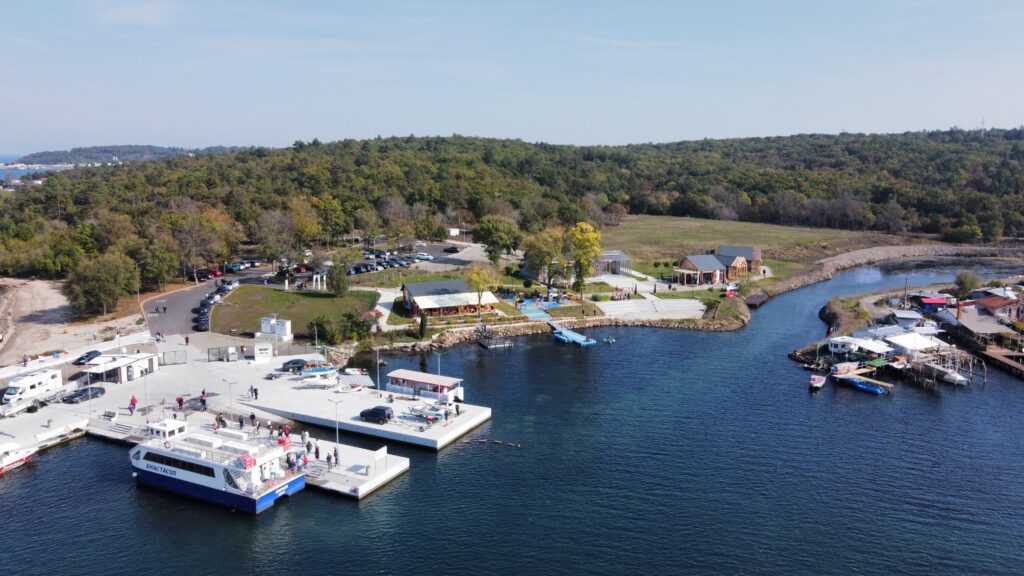Burgas is a city located on Bulgaria’s Black Sea coast. It is the administrative centre of the Burgas Region and one of the country’s most important economic, cultural, and transport hubs. Burgas ranks Bulgaria’s fourth largest city with a regional population of approximately 410,000 people.
Burgas places a strong emphasis on environmental sustainability and digital innovation, actively participating in European initiatives and projects aimed at urban development, smart cities, and green transformation.
Vesna Baltina, Deputy Mayor for Strategic Development, Ecology, Digitalisation, and Climate Adaptation at Burgas Municipality and project manager at Regions4Climate Project (R4C); Daniela Alexieva, Director of Innovative Systems Enterprise, a specialist in digital solutions responsible for the implementation of the R4C project; and Georgi Dimov, local representative of the Chengene Skele community of fishermen, engaged in a conversation with us on whether scientific data can help alleviate heatwaves in Burgas, the effects of climate change on Chengene Skele, and the local community’s engagement in climate resilience and the possible impacts of the R4C project on the Burgas region.

Scientific data helping to alleviate heatwaves in Burgas City
“Burgas is actively working on climate resilience strategies, including mitigating the effects of heatwaves,” says Daniela Alexieva. Scientific data plays a central role in these efforts by supporting evidence-based decision-making, innovative solutions, and cross-sectoral collaboration.
The R4C project uses advanced climate modelling and risk assessments to analyse heatwave trends and their socio-economic impact on Burgas. By integrating meteorological data, urban heat mapping, and vulnerability assessments, local authorities gain valuable insight into high-risk areas and population groups most affected by extreme temperatures.
One of the key approaches in Burgas is the implementation of nature-based solutions to counteract urban heat islands. Scientific data collected through satellite imagery and temperature sensors help identify priority zones for afforestation, green corridors, and water-based cooling solutions. Additionally, digital tools developed within the project assist in designing sustainable urban infrastructure, such as reflective pavements and energy-efficient buildings, reducing heat accumulation in the city.
Furthermore, social innovation and community engagement are integral to Burgas’s heatwave mitigation strategy. Data-driven awareness campaigns and citizen involvement platforms ensure residents and stakeholders have the knowledge and tools to adapt to rising temperatures. Burgas aims to create a more climate-resilient urban environment by combining technological advancements with participatory governance.

The effects of climate change on the community of Chengene Skele
“The past, present, and future of the fisherman community in Chengene Skele have always been related to the Black Sea,” says Georgi Dimov. “However, in recent years we must find answers for the changes in progress because climate change is inevitably influencing our lives and everyday activities. It’s clear that the climate is changing, but why aren’t we?”
In the past, there was sufficient time to adopt new solutions and practices. However, now the community struggles to adjust to the impacts of climate change as it takes a decade for a significant change in scenery. The previous decade (2011-2020) was the warmest on record, with sea levels and temperatures increasing. While describing the tight relationship between fishermen and marine ecosystems in terms of climate emergencies in need of urgent mitigation, Dimov points out the fastest growing threats such as extreme quantities of marine litter, noise pollution, and introduction of invasive species by discharge of ballast water to the open sea.
Local community’s engagement in climate resilience
“Engaging the local community in climate resilience is a multifaceted process that requires education, participation, sustainable practices, adaptation projects, economic incentives, collaboration, and emergency preparedness,” says Vesna Baltina. By empowering individuals and organisations to play an active role in climate adaptation, communities can build a more sustainable and resilient future. Governments, businesses, and civil society must work together to create inclusive strategies that ensure the long-term well-being of people and the environment. Through collective action, local communities can become key drivers of climate resilience, setting a strong foundation for global sustainability efforts.

How R4C will change the Burgas region
“One of the key impacts of the R4C project will be the integration of climate risk assessments into urban planning and policy-making,” says Alexieva. This would help local authorities make informed decisions on infrastructure, flood prevention, and land use based on advanced modelling and vulnerability mapping. She also says a major shift will come from adopting small technologies and digital tools to support climate adaptation. She adds that Burgas will use Internet of Things systems, AI-driven assessments, and early warning platforms to anticipate better and respond to climate-related risks.
As Baltina puts it, “The R4C project supports the expansion of urban green spaces, such as parks and tree-lined streets, and the conservation and restoration of wetlands.” These efforts will improve air quality, reduce urban heat, support biodiversity, and contribute to carbon sequestration. Burgas has the potential to become a leader in sustainable tourism by promoting eco-friendly practices and nature-based attractions. The project encourages eco-tourism, green businesses, and sustainable fisheries to boost the local green economy.
The R4C project could transform the Burgas region into a model for climate resilience in Bulgaria and beyond. By integrating nature-based solutions, community engagement, and economic incentives, Burgas can become a greener, more resilient, and prosperous region, ensuring a better quality of life for future generations.
